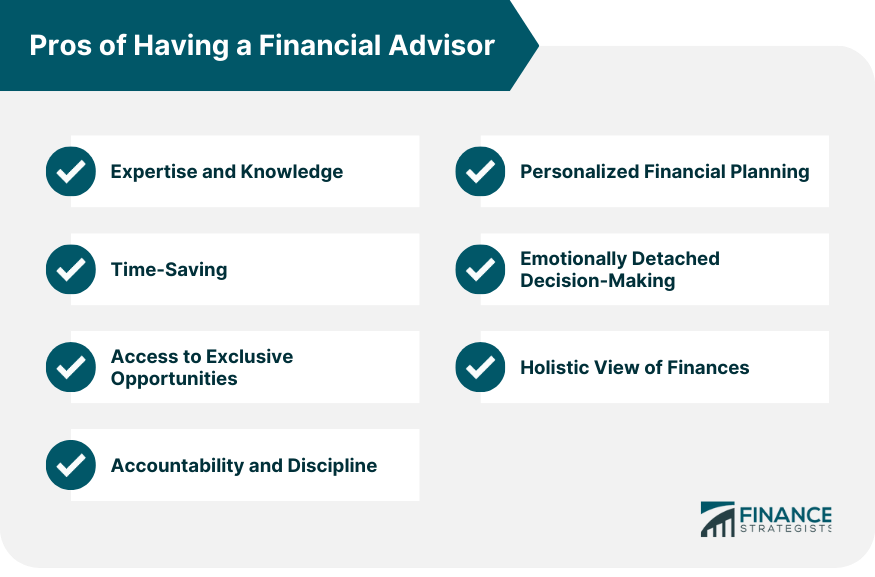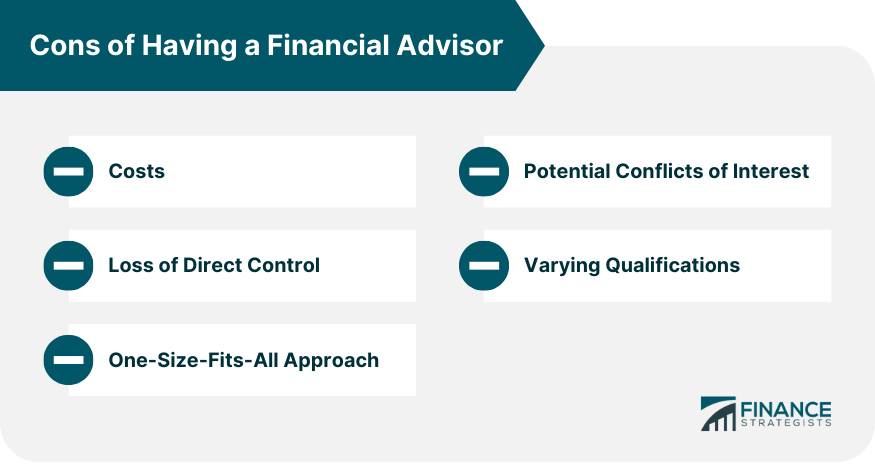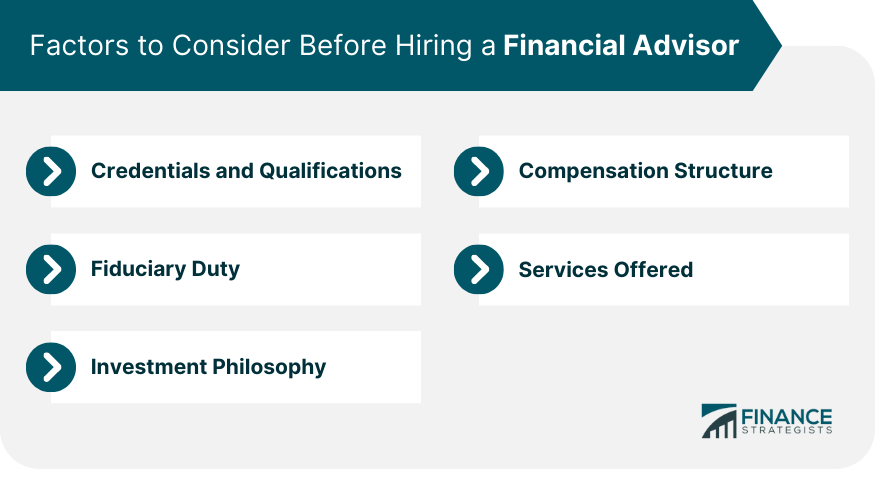A financial advisor serves as a guiding force for individuals and businesses seeking to make informed decisions about their finances. These professionals offer expertise on a wide range of financial topics, including investment strategies, retirement planning, tax planning, estate planning, and risk management. By analyzing their clients' current financial situations and understanding their short-term and long-term goals, financial advisors create tailored strategies that align with the client's objectives. As the economic landscape and personal circumstances change, they revisit and adjust strategies to keep clients on track toward achieving their financial dreams. Furthermore, beyond the technicalities of finance, a significant part of a financial advisor's role lies in building trust and fostering a solid relationship with their clients. A financial advisor brings to the table a deep understanding of financial markets, investment vehicles, and financial products that might be overwhelming for an average individual. They spend years acquiring formal education, certifications, and on-the-job experience. Beyond their foundational knowledge, they continuously stay abreast of financial trends, market shifts, and regulatory changes. As a result, clients can trust that the advice they receive is based on the most current and comprehensive information. Their expertise also allows them to navigate complex financial scenarios with ease, reducing the risk of costly mistakes. Every individual has unique financial goals and circumstances. Financial advisors excel in assessing these specifics and crafting strategies that are custom-fit to one's financial aspirations, whether it's buying a house, securing a child's college education, or retiring comfortably. Their recommendations are tailored, taking into account various factors like risk tolerance, time horizon, and individual priorities. Such personalized attention ensures that the advice aligns seamlessly with the client's life stage and aspirations. Researching investments, monitoring portfolios, and staying updated on market news can be time-consuming. A financial advisor takes on these responsibilities, allowing clients to spend their time on other pursuits. The convenience of having a professional manage financial details allows for peace of mind. Furthermore, it ensures that critical financial actions, such as rebalancing portfolios and making tax-efficient decisions, are not overlooked. Financial markets can be volatile, and news headlines can trigger emotional responses. These emotions, if unchecked, can lead to impulsive investment decisions, like selling out of fear during a market downturn or buying out of greed during a rally. A financial advisor offers an objective perspective, ensuring decisions are rooted in strategy rather than emotion. Their presence provides a stabilizing force, helping clients stay the course during uncertain times. Some investment opportunities, particularly in the realms of alternative investments or certain mutual funds, are not readily available to the average investor. Financial advisors often have access to these exclusive opportunities due to their networks and affiliations. This inside access can be pivotal in enhancing portfolio returns and diversification. Moreover, advisors often have knowledge about these niche opportunities that would be hard for individuals to gather independently. Finances are interconnected. An investment decision might have tax implications; estate planning might influence investment choices; insurance needs might be tied to overall wealth. A financial advisor looks at these components holistically, ensuring that decisions made in one area complement and do not conflict with another. This comprehensive view ensures that no financial aspect is overlooked and that all elements work cohesively to achieve the client's goals. Consistency is key in financial planning, and sometimes, having someone to answer to can foster discipline. Regular check-ins with a financial advisor can serve as a motivator, ensuring clients stick to their financial plan and make necessary adjustments when required. With their guidance, individuals find it easier to resist the temptation of straying from their financial strategies. Furthermore, knowing there's an expert overseeing their finances can boost confidence and commitment to long-term objectives. Engaging a financial advisor often comes with fees, which can sometimes be substantial depending on the compensation structure. They might charge a percentage of assets under management, hourly rates for consultation, or flat fees for specific services. Over time, these fees can accumulate and potentially eat into the overall returns on investments. For individuals with simpler financial situations, the costs might outweigh the benefits, making self-management a more economical choice. Not all financial advisors operate with a fiduciary duty to put their client's best interests first. Some might receive commissions or kickbacks for recommending certain financial products or services. This can sometimes cloud their judgment and lead them to make suggestions that are more beneficial to them than to their clients. It's crucial for clients to understand how their advisors are compensated to ensure that the advice they're receiving is unbiased and aligned with their best interests. While many appreciate the guidance and expertise of a financial advisor, others might feel uncomfortable relinquishing direct control over their finances. By delegating decisions to an advisor, they might feel detached or out of the loop regarding their own investments and financial strategies. Some individuals derive satisfaction and confidence from hands-on management and might miss the active involvement when an advisor takes the reins. The title "financial advisor" can be used by a broad spectrum of professionals, each with different levels of expertise, training, and credentials. While some advisors hold advanced degrees and certifications, others might have more limited qualifications. It can be a daunting task for clients to sift through and verify the credentials of potential advisors. There's a risk of partnering with someone who might not have the necessary expertise to competently manage complex financial scenarios. Although many financial advisors pride themselves on offering tailored advice, not all provide bespoke services. Some might rely on generic financial plans or boilerplate investment strategies, which might not align perfectly with an individual's unique financial situation and goals. A one-size-fits-all approach can lead to missed opportunities and suboptimal financial outcomes, making it imperative for clients to ensure they're receiving truly personalized guidance. Before engaging a financial advisor, it's essential to review their educational background, professional certifications, and affiliations. Some of the most respected designations in the industry include Certified Financial Planner (CFP), Chartered Financial Analyst (CFA), and Personal Financial Specialist (PFS). These credentials often indicate that the advisor has undergone rigorous training and adheres to a set standard of professionalism and ethics. Understanding how an advisor is compensated is crucial to assessing potential conflicts of interest. Some advisors earn commissions on the products they sell, while others charge a fee based on assets under management, hourly rates, or a flat fee. Fee-only advisors often align better with client interests as they don't earn commissions from selling specific products. Determine whether the financial advisor acts as a fiduciary. A fiduciary is obligated to act in the best interests of the client, putting the client's needs before their own or their firm's interests. This ethical stance ensures that the advice and recommendations provided are unbiased and tailored to the client's situation. Financial advisors can offer a range of services, from investment management to comprehensive financial planning, tax planning, estate planning, and more. It's essential to identify what services you require and ensure the advisor you're considering can cater to those needs. Different advisors may have varying investment philosophies, from active stock-picking to passive index investing. Before hiring an advisor, it's crucial to understand their investment approach and ensure it aligns with your own beliefs, risk tolerance, and financial goals. Financial advisors play an instrumental role in guiding individuals and businesses in making astute financial decisions. They offer expertise in diverse areas such as investment strategies, retirement and tax planning, and risk management, tailoring advice to client-specific goals. As situations evolve, they modify strategies, emphasizing the importance of trust and strong client relationships. The benefits of hiring a financial advisor include financial knowledge, personalized financial planning, time-saving, objective decision-making, access to exclusive investment opportunities, a holistic financial approach, and fostering accountability. However, considerations include costs, potential conflicts of interest, loss of direct control, varying qualifications, and the possibility of generic advice. Before engaging a financial advisor, individuals should evaluate their credentials, compensation structure, fiduciary duty, services offered, and investment philosophy to ensure alignment with their financial objectives.What Does a Financial Advisor Do?
Pros of Having a Financial Advisor
Expertise and Knowledge
Personalized Financial Planning
Time-Saving
Emotionally Detached Decision-Making
Access to Exclusive Opportunities
Holistic View of Finances
Accountability and Discipline

Cons of Having a Financial Advisor
Costs
Potential Conflicts of Interest
Loss of Direct Control
Varying Qualifications
One-Size-Fits-All Approach

Factors to Consider Before Hiring a Financial Advisor
Credentials and Qualifications
Compensation Structure
Fiduciary Duty
Services Offered
Investment Philosophy

Conclusion
Pros and Cons of Having a Financial Advisor FAQs
The pros of having a financial advisor include expert financial knowledge, personalized financial planning, time-saving, emotionally detached decision-making, access to exclusive investment opportunities, a holistic approach to finances, and fostering accountability and discipline.
The cons of having a financial advisor include costs associated with their services, potential conflicts of interest, loss of direct control over finances, the varied qualifications among advisors, and the possibility of receiving a one-size-fits-all approach to financial planning.
For those with complex financial scenarios, the pros of having a financial advisor can provide expert advice, personalized strategies tailored to individual goals, access to unique investment opportunities, and a comprehensive approach to interconnected financial matters, often outweighing concerns about costs or potential conflicts of interest.
Assess your comfort level with financial decision-making, your financial goals, time commitment, and willingness to pay for expertise. If you find the potential benefits align more with your needs than the disadvantages, a financial advisor might be a good fit.
Prioritize open communication, clarify your financial objectives, understand their compensation structure, ensure they have a fiduciary responsibility, and regularly review and assess the financial strategies in place.
True Tamplin is a published author, public speaker, CEO of UpDigital, and founder of Finance Strategists.
True is a Certified Educator in Personal Finance (CEPF®), author of The Handy Financial Ratios Guide, a member of the Society for Advancing Business Editing and Writing, contributes to his financial education site, Finance Strategists, and has spoken to various financial communities such as the CFA Institute, as well as university students like his Alma mater, Biola University, where he received a bachelor of science in business and data analytics.
To learn more about True, visit his personal website or view his author profiles on Amazon, Nasdaq and Forbes.















